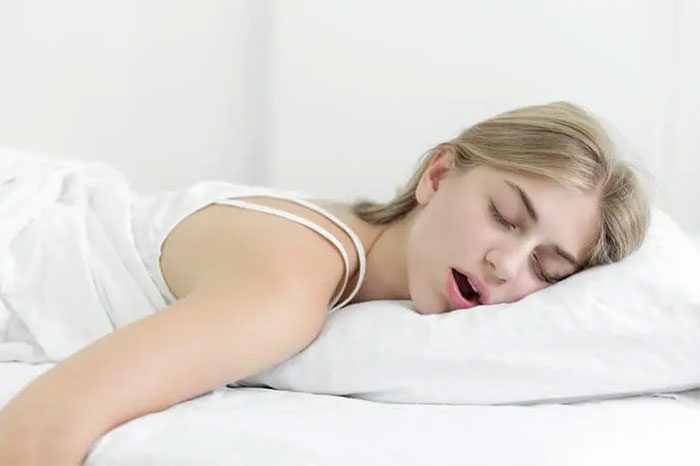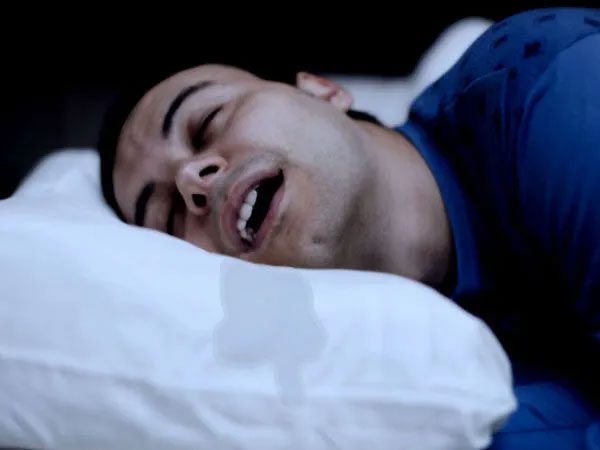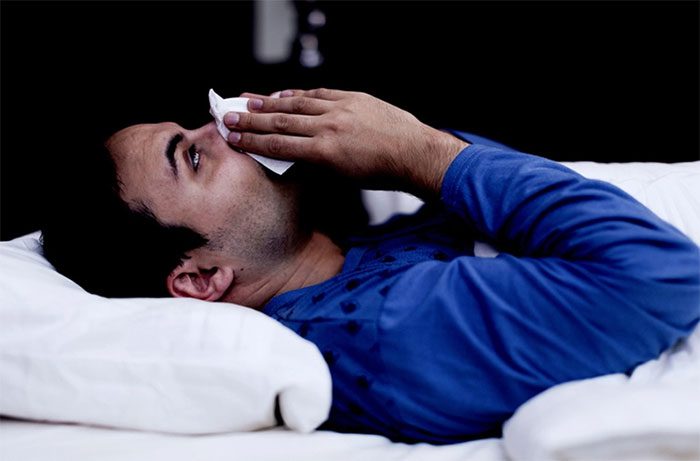The first thing to remember before exploring the causes of drooling during sleep is that it is a completely normal phenomenon.
Drooling while sleeping is a natural occurrence. Your mouth continues to produce saliva during sleep to protect the hard and soft tissues inside the mouth and throat from acid and bacteria.
What You Need to Know About Snoring
However, if drooling occurs frequently or there’s a sudden increase in saliva production, it could indicate an underlying health condition.
1. Causes of Drooling While Sleeping
Here are some common causes of drooling during sleep, some of which require early medical evaluation:
Sleeping Position
When you sleep, the body’s muscles are relaxed, especially during the REM (Rapid Eye Movement) phase of sleep. As the facial and body muscles relax, your mouth may fall into an “open” position, allowing excess saliva to drip out.
Particularly, if you sleep on your side or stomach, saliva may flow out from both sides of your mouth.
Medication Side Effects
Drooling can be a side effect of certain medications, including sedatives, antipsychotics, some antibiotics, certain medications for Alzheimer’s disease, and some non-steroidal anti-inflammatory drugs (NSAIDs).
If you are taking medications with side effects that cause drooling, do not stop taking them abruptly; instead, consult your doctor for alternatives or dosage adjustments.

There are many reasons why you may drool while sleeping. (Image: Internet).
Nasal Congestion
One of the main reasons your mouth may open while sleeping is due to nasal congestion, such as that caused by a cold or allergies. This can lead to drooling onto your pillow or blanket.
Additionally, a deviated septum can partially block airflow in the nose, causing congestion.
Sleep Apnea
Sleep apnea can cause you to breathe through your mouth at various times or throughout the night, leading to increased saliva production. In addition to drooling, individuals with sleep apnea may snore loudly, experience choking, have a sore throat and dry mouth upon waking, and feel fatigued during the day.
This condition requires medical evaluation for improvement strategies.
Neurological Conditions
Some individuals experience excessive saliva production, known as sialorrhea, which can result from traumatic brain injury, stroke, obstructed blood flow to the brain, Parkinson’s disease, or cerebral palsy.
These conditions can make swallowing more difficult, leading to drooling both during sleep and while awake.
Pregnancy
Pregnant women may experience a condition known as ptyalism gravidarum during the early months, which can lead to drooling while sleeping. Other related symptoms include swollen salivary glands, difficulty sleeping, irritability, and discomfort.
Gastroesophageal Reflux Disease
Drooling while sleeping may also be associated with gastroesophageal reflux disease (GERD), which causes acid to frequently reflux into the esophagus. In addition to heartburn, another symptom of this condition is dysphagia, which can feel like food is stuck in the throat, leading to more saliva production.

Drooling while sleeping can lead to dry mouth and throat. (Image: Internet).
Oral Health Issues
If you are producing excessive saliva and experiencing mouth or gum pain, this may be a sign of an oral infection or dental cavities. The increased saliva production is a way for your body to fight infections in the mouth.
Swallowing Disorders
Dysphagia refers to any health condition that makes swallowing difficult. If you are drooling excessively, this could signal conditions like multiple sclerosis, Parkinson’s disease, muscular dystrophy, or even types of cancer such as throat cancer, which can also cause difficulty swallowing saliva.
2. How to Stop Drooling While Sleeping?
Generally, treatment for drooling while sleeping is not necessary, although it can be uncomfortable; it is not a cause for dehydration, infection, or other issues. Depending on the underlying cause, you may have various remedies to stop drooling while sleeping, such as:
- Changing your sleeping position to lying on your back: By sleeping on your back, you can better control the flow of saliva so that it does not drip out. However, be cautious if you feel short of breath or experience acid reflux when trying to sleep on your back.
- Discussing medication side effects with your doctor if you are taking any medications
- Treating allergies to help you breathe more easily through your nose

Depending on the cause of your drooling while sleeping, the remedies will vary. (Image: Internet).
- Managing a deviated septum with medication or surgical intervention to help reduce uncomfortable symptoms
- Treating sleep apnea through lifestyle changes, maintaining a healthy weight, or using medical respiratory aids or surgery as prescribed
- If you have underlying neurological conditions, medications may be required, including those for excessive saliva production
Removing salivary glands may be necessary in cases of more severe underlying neurological issues beyond just drooling while sleeping.
- Managing gastroesophageal reflux disease through lifestyle changes, sleeping positions, or other medical interventions
- Using medications like Scopolamine (also known as hyoscine) that block nerve impulses before they reach the salivary glands. This medication is often provided as a patch behind the ear, releasing medication continuously for about 72 hours. However, side effects of scopolamine may include dizziness, drowsiness, increased heart rate, dry mouth, and itchy eyes.
Note that you should not use medication without a doctor’s prescription. If your drooling is excessive and persistent, you should consult a doctor for a precise diagnosis and timely intervention.


















































